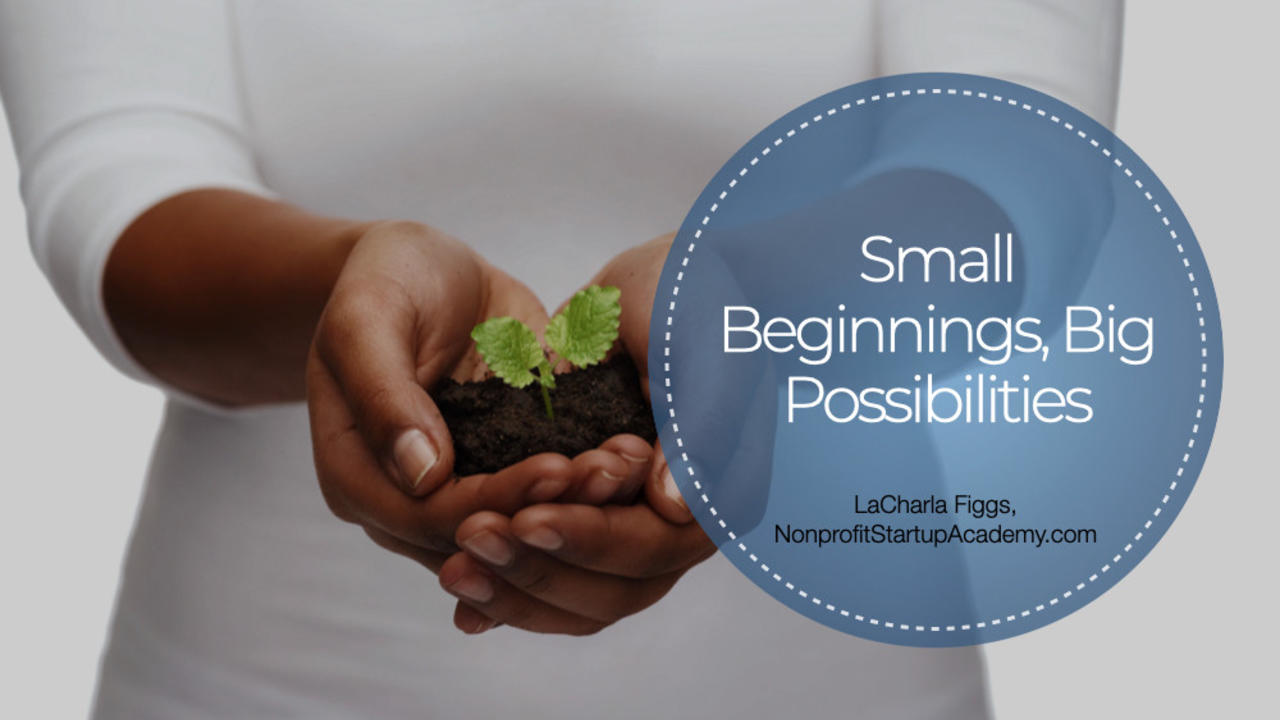
Some of us have Big Dreams. Dreams of helping people in need. Dreams of making our lives count for something important. Dreams of doing something that needs to be done, that no one else is doing.
We dream big because we’re natural-born Change-Makers.
So why haven’t we gotten started yet? Why is the Dream still just a dream?
Fear of Starting Small
Maybe because the Dream is so big, we think only a big program or project will have the BIG impact we want to have. We don’t have the resources to start Big right now; so anything we start would have to be small. Small and insignificant.
And that’s not what we’re about. Right?
So instead of starting small, we do nothing. We keep dreaming the Dream. And talking about the Dream. And waiting for the far-off “someday” when the Dream comes true.
Maybe because we’re afraid or maybe too prideful to start small.
Great Things Come In Small Packages
Ask any woman who’s ever gotten a beautiful necklace or an engagement ring if great things come in small packages. They do!
So why not consider starting small with your Dream? A small beginning doesn’t have to mean an unimportant one. There’s no reason it should lack impact.
Imagine the look on the faces of a handful of children when you provide them with stylish, well-fitting school clothes and shoes and all the supplies they’ll need for school. Kids who wouldn’t have these without your "small" program.
Now, imagine how their parents would feel seeing their excited kids ready for school. Not only will their children not feel self-conscious at school, but the parents can use their scarce resources to buy nutritious food instead of school clothes and supplies.
This might be a "small" project, but what a difference that would make! For the kids and the parents!
"Small" can have real impact!
Break It Down
Okay, so maybe you’re convinced that you don’t have to wait 10 long years and 1 dark night to pursue your big Dream. You’re okay with starting small.
But how do you do that?
The how-to will vary from one Dream to the other. Each program or project will be different. But to help you get started, here are 4 things to try:
- First, identify what you’ll need to make your program successful. Not down to the paper clips; just list the important things. (Volunteers, space, supplies, types of equipment, etc.)
- Consider the resources you have and decide how to use them. (Your time, volunteer time from family and friends, contributions from your savings, your coworkers, and friends, etc.)
- Then brainstorm ways to serve just a few people at a time or to serve a smaller geographic area. Work with the resources you have. For example, limit the number of people you serve in a month–to say 100–instead of everyone who comes in the door. Or, if you hope to serve your county, start by serving a small neighborhood in your county.
- Explore potential partnerships, especially with organizations that offer other services to the same people you hope to serve. For example, if you offer a support group for people with a particular medical diagnosis, maybe you can partner with the local clinic and the regional hospital. They might provide space and referrals.
As you open your mind to new possibilities and start talking to people in your community, you’ll probably come up with other ideas. Keep exploring options until you’ve crafted a program you can launch sooner rather than later.
Small Start, Big Bonus
You might see the benefit of starting small and maybe even the need to do it. But I wonder if you’ve considered those extra bonuses?
Of course, you’ve probably thought about the appreciation you’ll get from the people you help and the satisfaction of pursuing your Purpose. Of making a real difference in the world.
You might not have considered momentum. Things at rest tend to stay at rest, and things in motion tend to stay in motion. (Thanks, Sir Isaac Newton!) Your small start can energize you, get you off the sofa and into action. And as you stay in motion, you’ll serve more people, make new connections, and see new possibilities.
Plus, your small start can be the seed of new growth. How? Many—if not most—grantmakers prefer to support efforts that have a track record–that are stable and sustainable. They don’t want to be your financial savior; they prefer to see that you can survive without their investment.
Starting small will give you a chance to build your program and your organization slowly and to develop a track record of success. Growth will bring challenges, and starting small can help equip you for that growth. Your maturity as a leader and the effectiveness of your program may help you attract grants and contributions. And those could be the ticket to future growth.

